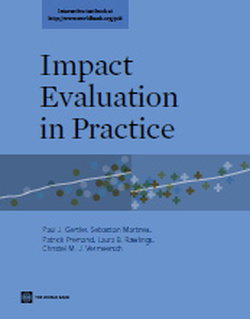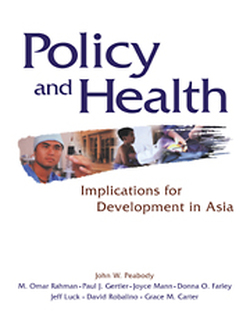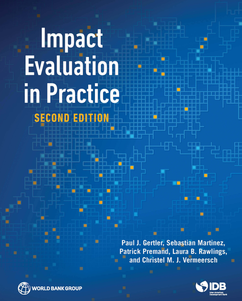|
Impact Evaluation in Practice: Second Edition
This second edition handbook is a comprehensive introduction to impact evaluation for policymakers and development practitioners. The updated version covers the latest techniques for evaluating programs, with expanded case studies. It also includes materials on field methods and research ethics with links to complementary online instructional material. The book is accompanied by a new online course on Applied Impact Evaluation. |

Impact Evaluation in Practice
Impact Evaluation in Practice presents a comprehensive, easy-to-understand introduction to impact evaluation. With many real-life and hypothetical examples, it gives an overview of how to design and use impact evaluation to build more effective programs to alleviate poverty and improve people's lives. The goal is to further the ability of policymakers and practitioners to use impact evaluations to help make policy decisions based on evidence of what works the most effectively.
Impact Evaluation in Practice presents a comprehensive, easy-to-understand introduction to impact evaluation. With many real-life and hypothetical examples, it gives an overview of how to design and use impact evaluation to build more effective programs to alleviate poverty and improve people's lives. The goal is to further the ability of policymakers and practitioners to use impact evaluations to help make policy decisions based on evidence of what works the most effectively.

Health Policy in Asia: Options for Developing Countries
This rich volume provides a comprehensive look at how policy leads to better health in Asia. Leading RAND thinkers, working in different disciplines, create an all-encompassing framework for students, scholars, and policymakers, clarifying what is known and still needs to be known about how policy and practice lead to better health outcomes in developing countries. Drawing on their broad experience, the authors explore the health effects of macroeconomic development, education, and technology. After making compelling arguments about the need for policymakers to use and demand evidence-based policy, they investigate the epidemiology of persistent infectious diseases and the rapid ascendancy of chronic diseases in the elderly, showing how effectively appropriate clinical medicine addresses illness and promotes well- being. Emphasis is placed on examining equity-improving solutions to ascertain how and where they have helped the poor, women, and other vulnerable populations. The book concludes with a discussion of politics, priorities, the private sector, and what role healthy departments should play to translate policy objectives into better health.
This rich volume provides a comprehensive look at how policy leads to better health in Asia. Leading RAND thinkers, working in different disciplines, create an all-encompassing framework for students, scholars, and policymakers, clarifying what is known and still needs to be known about how policy and practice lead to better health outcomes in developing countries. Drawing on their broad experience, the authors explore the health effects of macroeconomic development, education, and technology. After making compelling arguments about the need for policymakers to use and demand evidence-based policy, they investigate the epidemiology of persistent infectious diseases and the rapid ascendancy of chronic diseases in the elderly, showing how effectively appropriate clinical medicine addresses illness and promotes well- being. Emphasis is placed on examining equity-improving solutions to ascertain how and where they have helped the poor, women, and other vulnerable populations. The book concludes with a discussion of politics, priorities, the private sector, and what role healthy departments should play to translate policy objectives into better health.

The Willingness to Pay for Medical Care
The rising cost of health care presses hard on developing and industrial countries alike. The burden is heavier in the developing world, however, because resources are scarcer, people tend to be in poorer health, and health services are less advanced and more inequitably distributed. This book documents these problems by analyzing data from the Living Standards Measurement Surveys in Cote d'Ivoire and Peru.
The rising cost of health care presses hard on developing and industrial countries alike. The burden is heavier in the developing world, however, because resources are scarcer, people tend to be in poorer health, and health services are less advanced and more inequitably distributed. This book documents these problems by analyzing data from the Living Standards Measurement Surveys in Cote d'Ivoire and Peru.
